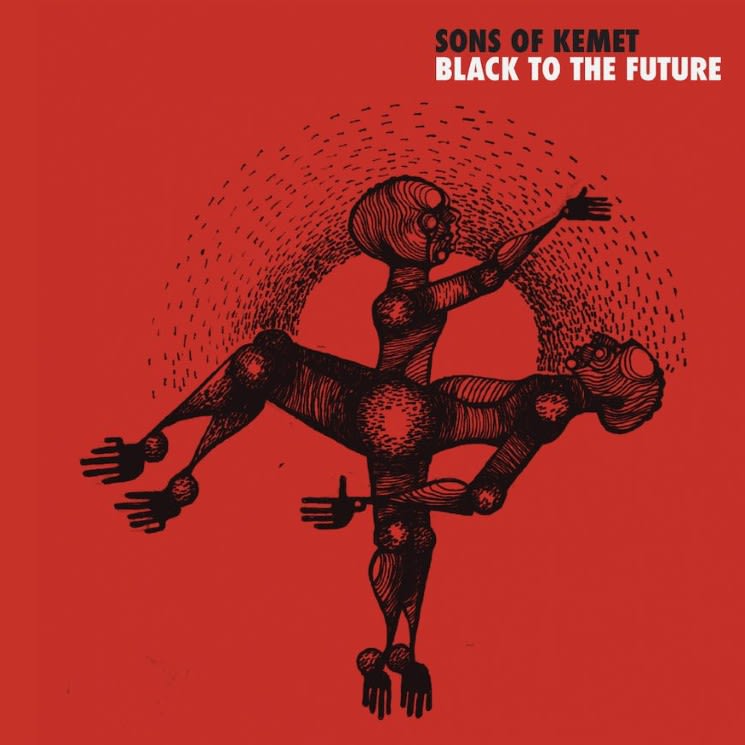In many respects, jazz has acted as a vehicle in which musicians can draw from a vast well of historical and contextual memory, transforming their sound to encompass elements of the past, present, and future. Shabaka Hutchings, saxophonist and bandleader of UK jazz group Sons of Kemet, understands the significance that history holds within the realm of music. Having played in several other jazz ensembles, such as Afrofuturist group the Ancestors, and even with Sun Ra Arkestra, Hutchings' work has made him a hot topic within music circles. His recent work with Sons of Kemet has been met with critical acclaim for its unique blend of Caribbean and South African genres, with an acute awareness of current culture and politics.
Following their acclaimed 2018 release Your Queen is a Reptile, Sons of Kemet's latest LP, Black to the Future, is a rich and musically diverse exploration of the frustration and anger that accompany Black identity. The album symbolizes a cosmological journey inwards, urging listeners to look towards the past in order to provide a better understanding of the future.
Fitting well within the themes of the album, Black to the Future draws influence from a wide variety of historically Black genres, namely Afrobeat, dub and grime. And while the band's influences can be heard quite clearly, the album by no means feels uninspired — it simply highlights Hutchings' ability to create varied arrangements while calling back to the signature sounds that have helped create an open environment for him to explore.
Black to the Future begins and ends with harrowing spoken word provided by musician and poet Joshua Idehen, whose vocals are backed by a beautiful arrangement of brass and wind instrumentation. Idehen's words are teeming with emotion, providing a poetic narrative to how the past contextualizes the present and future; "I am Field Negro now / I do not want your equality, it was never yours to give me, and even then it was too minor." The connection of the past to the present is sentiment echoed throughout Black to the Future, and provides a poignant opening statement on the direction the album aims to take.
Hutchings' compositions on Black to the Future are diverse and heavy, containing grooves that delve deep into rhythmic jams. The percussion on these arrangements are intricate and hypnotizing, providing a stable framework for Hutchings' instrumentation to work in full effect. And through wielding these instrumentations, Black to the Future masterfully elicits the raw emotion that accompanies history and identity. Tracks such as "In Remembrance of Those Fallen" and "Envision Yourself Levitating" beautifully capture these feelings of pain and sorrow.
The meaning in Black to the Future is not universal, but instead is shaped by the cultural context of the listener. Hutchings' compositions are shaped by his own understanding of the past, and in turn reflect a more profound interpretation of music and its relation with history. The music is raw, melodic and explosive, and captures the inner reflection one must undertake to properly envision the future.
(Impulse)Following their acclaimed 2018 release Your Queen is a Reptile, Sons of Kemet's latest LP, Black to the Future, is a rich and musically diverse exploration of the frustration and anger that accompany Black identity. The album symbolizes a cosmological journey inwards, urging listeners to look towards the past in order to provide a better understanding of the future.
Fitting well within the themes of the album, Black to the Future draws influence from a wide variety of historically Black genres, namely Afrobeat, dub and grime. And while the band's influences can be heard quite clearly, the album by no means feels uninspired — it simply highlights Hutchings' ability to create varied arrangements while calling back to the signature sounds that have helped create an open environment for him to explore.
Black to the Future begins and ends with harrowing spoken word provided by musician and poet Joshua Idehen, whose vocals are backed by a beautiful arrangement of brass and wind instrumentation. Idehen's words are teeming with emotion, providing a poetic narrative to how the past contextualizes the present and future; "I am Field Negro now / I do not want your equality, it was never yours to give me, and even then it was too minor." The connection of the past to the present is sentiment echoed throughout Black to the Future, and provides a poignant opening statement on the direction the album aims to take.
Hutchings' compositions on Black to the Future are diverse and heavy, containing grooves that delve deep into rhythmic jams. The percussion on these arrangements are intricate and hypnotizing, providing a stable framework for Hutchings' instrumentation to work in full effect. And through wielding these instrumentations, Black to the Future masterfully elicits the raw emotion that accompanies history and identity. Tracks such as "In Remembrance of Those Fallen" and "Envision Yourself Levitating" beautifully capture these feelings of pain and sorrow.
The meaning in Black to the Future is not universal, but instead is shaped by the cultural context of the listener. Hutchings' compositions are shaped by his own understanding of the past, and in turn reflect a more profound interpretation of music and its relation with history. The music is raw, melodic and explosive, and captures the inner reflection one must undertake to properly envision the future.
